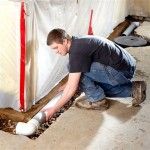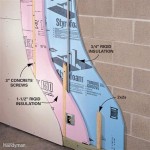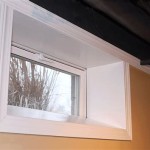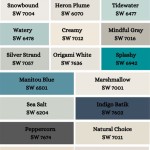Best Way To Finish a Concrete Basement Floor
Finishing a concrete basement floor transforms a cold, damp space into a comfortable, usable area. Numerous options exist, each with advantages and disadvantages concerning cost, durability, and aesthetics. Choosing the right finish requires careful consideration of the basement's intended use, existing moisture levels, and budget.
Assessing the Basement Environment
Before selecting a flooring material, assessing the basement's environment is crucial. This includes evaluating moisture levels, the potential for flooding, and the overall condition of the existing concrete slab. High moisture levels can lead to problems with certain flooring types, such as warping or mold growth. Repairing cracks or imperfections in the slab is essential before proceeding with any finishing option.
Moisture Mitigation Strategies
Proper moisture mitigation is critical for long-term basement floor success. Strategies include installing a vapor barrier beneath the flooring, ensuring proper drainage around the foundation, and using a dehumidifier to control humidity levels. These measures help prevent moisture-related issues that can damage flooring and create unhealthy living conditions.
Concrete Floor Preparation
Adequate preparation of the concrete slab is paramount for a successful finish. This process typically involves cleaning the surface thoroughly to remove any dirt, debris, or existing coatings. Repairing cracks or uneven areas ensures a smooth and level substrate for the chosen flooring material. Depending on the chosen finish, a primer might be necessary to improve adhesion.
Epoxy Coatings
Epoxy coatings provide a durable, moisture-resistant finish for concrete basement floors. They offer excellent protection against stains, chemicals, and abrasion. Available in various colors and finishes, epoxy coatings create a seamless, easy-to-clean surface. However, proper surface preparation and meticulous application are crucial for optimal results.
Painting Concrete Floors
Painting is a cost-effective option for finishing concrete basement floors. Masonry paint, specifically designed for concrete surfaces, offers good durability and moisture resistance. Proper surface preparation, including cleaning and priming, is necessary for good adhesion and longevity of the paint finish. While less durable than epoxy, paint offers a versatile and affordable solution.
Concrete Staining
Concrete staining offers a unique aesthetic, enhancing the natural look of the concrete while adding color and depth. Acid-based stains react chemically with the concrete, creating a variegated, marble-like effect. Water-based stains offer a wider range of colors and are environmentally friendly. Staining provides a durable finish suitable for basement environments.
Rubber Flooring
Rubber flooring provides a comfortable, resilient surface suitable for basements used as play areas or gyms. Available in tiles or rolls, rubber flooring offers good insulation and sound absorption. It is also resistant to moisture and mold growth, making it a practical choice for basements prone to dampness.
Vinyl Flooring
Vinyl flooring is a versatile and affordable option for basement floors. Available in sheets, tiles, or planks, vinyl offers a wide range of styles and designs, mimicking the look of hardwood or tile. Some vinyl flooring options, like luxury vinyl plank (LVP) or luxury vinyl tile (LVT), offer enhanced durability and water resistance, making them suitable for basement applications. Proper installation is crucial for preventing moisture issues beneath the flooring.
Carpet Tiles
Carpet tiles offer a warm and comfortable flooring option for basements. Their modular design allows for easy installation and replacement of individual tiles if damaged. Choose carpet tiles with a moisture-resistant backing to prevent mold and mildew growth. Adequate subfloor preparation and proper installation are vital for preventing moisture issues.
Interlocking Tile Systems
Interlocking tile systems provide a quick and easy DIY flooring solution for basements. Available in various materials, including plastic, rubber, and foam, these tiles offer good insulation and can be installed directly over the concrete slab. They are particularly suitable for basements prone to moisture, as they allow for air circulation beneath the flooring.
Subfloor Systems for Finished Flooring
For those desiring traditional finished flooring like hardwood or laminate, installing a subfloor system is essential. Raised subfloors create an air gap between the concrete and the finished flooring, preventing moisture transfer and providing insulation. These systems can be constructed using treated lumber or specialized subfloor panels designed for basement applications.
Considering Budget and Installation
The cost of finishing a concrete basement floor varies significantly depending on the chosen material and installation method. Some options, such as painting or epoxy coatings, can be relatively inexpensive and DIY-friendly. Others, like hardwood or subfloor systems, require professional installation and a higher budget. Carefully consider the project budget and level of DIY experience when selecting a flooring option.

How To Stain Concrete Basement Floor Diy Guide

Diy Basement Floor Stain And Finish 2 Colors Without Etching Youtube

Blog Ideas For Your New Concrete Finished Basement

A Guide To Stained Concrete Basement Floors

Ask Steve Maxwell How To Fix Concrete Floor Cracks With Paint

15 Diy Basement Flooring Ideas Affordable Options For Basements

Marblelife Basement

Which Resinous Floor Types Are Most Popular For Garages And Basements Black Rhino Floors

Benefits Of Basement Flooring Finishes Zenith Painting Coatings

How To Stain Concrete Basement Floor Diy Guide








